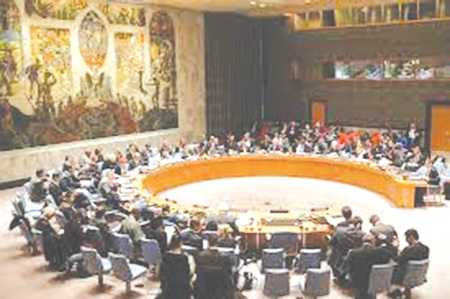
Unfolding efforts of UN in context of international peace, security
The involvement of the United Nations (UN) in peace building is clearly manifested in its operations in Liberia, Bosnia and Herzegovina, El Salvador, Kosovo, UN missions in Ethiopia and Eritrea. All these operations are conducted under the Security Council mandates through resolutions.
Advertisement
The function and power of the Security Council should not be trifled with. This organ of the UN has been trusted with the maintenance of international peace and security. Members of the Security Council should also understand that they have a unique responsibility and that should not be taken for granted. The welfare of every person on this planet is committed to the charge of the Security Council.
Resolutions are carefully carved out by the Council because it is dealing with human life and human security. Decisions on subordinate matters require the vote of the majority of members. Fifteen member countries decide for more than 100 member countries in matters relating to international peace and stability.
By its resolution 1500 of August 14, 2003, the Security Council established the United Nations Assistance Mission for Iraq (UNAM I).
The Security Council authorised a multinational force under unified command to take all the necessary measures to contribute to the maintenance of international peace and stability in Iraq (Resolution 1511 of October 16, 2003).
Environments
Environments that are risky for the UN and other humanitarian personnel don’t change the commitment of the UN Security Council to advance its plans in the area of development, security and human rights.
For instance, resolution 1511 on Iraq was to contribute to the Security of UNAM I and the governing council of Iraq. The UN lost one of its high-ranking officials in Iraq through a terrorist attack that was the Envoy of the Secretary-General.
The Security Council did not back out from her post conflict peace building programmes for Iraq and West Timor. “In paragraph 4 of its resolution 1334 (2000) 22nd December, the Security Council commended my efforts to seek further commitments of troops for UNAMSIL and urged all states in a position to do so, to consider contributing peacekeeping forces to the mission.” (Ninth report of the Secretary- General the United Nations Mission in Sierra Leone, Security Council, March 14, 2007, New York) in Albert Antwi Boasiako (Almere, Netherlands, The Voice Magazine. August 2002 page 22. Africa Refuge Crisis in a changing world). The UN Security Council has demonstrated an equitable relation to all member countries irrespective of race, colour and geographical location.
Commitment
The UN demonstrates that commitment is consonant with persistency even in the face of extreme danger. The Security Council did not change its plans because of this tragedy.
An angry crowd stormed a UN relief office in West Timor on September 6, 2000. The mob sacked personnel from the building and burnt the bodies of three UN workers in the streets. Carlos Carceres, a UNHCR legal officer, a citizen of the United States and two other UN personnel were burnt in West Timor.
Even though the UN quickly evacuated its remaining personnel from this Indonesia province, it did not entirely wipe West Timor from its post-conflict peace building programme.
Around the same time, hundreds of UN peacekeepers were held hostage in Sierra Leone. British troops who went in to rescue their blue helmet predecessors were victimised.
The only step the UN took was to lay out a prescription for more robust forces, command and control. A report from the UN on these events reinvigorated debates that did not depart from the existing ones.
Diverse
The UN is seeking diverse ways to protect peaceful coexistence, to expose crimes and criminals, after establishing the International Criminal Tribunal for the prosecution of persons responsible for genocides and other serious violations of international law in specific territories. The tribunal prosecuted people who were responsible for genocides in the territories of the former Yugoslavia, Liberal, Sierra Leone and other countries where conflicts exploded.
The mandate of the tribunal is to reduce the occurrences of wars and to send signals to people who intend to perpetrate human right violations in times of wars. The tribunal under the canopy of the Security Council will continue to investigate into war crimes in war torn- zones. Ongoing interstate and intra state wars are under its inspecting eyes.
Further to emphasise the willingness of the UN in the preservation of international peace and Security, the general assembly programmed 2005 as the international year of sports and physical education with the aim of promoting education, health, development and peace. The intention of the UN was to promote peace through regional, national and international levels through sports. International Year of Sport which was included in the provisional agenda of the fifty-sixth session of the General Assembly in 2003 was converted to a sport for peace and development upon the request of Tunisia (A/58/192). (UN General Assembly Sixty-third session, September 19, 2003 page 7).
The Security Council continues to demonstrate its commitment to the charter of the United Nations. This underlining principle of the Council should be supreme over personal policies and dispositions.
The challenges ahead are daunting. But the United Nations has proven, at various stages of its history that it is capable of remaking itself to rise to new challenges.
The writer is Initiator,
International Forum on the Status of Refugees in the world/
Senior Lecturer, Coordinator, Russian Section.
University of Ghana.
E-mails; aabosiakoug.edu.gh/abosiako2yahoo.com



